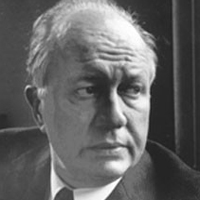I Knew a Woman by Theodore Roethke: Summary and Critical Analysis
The poem I Knew a Woman by Theodore Roethke is a very sensual poem as it depicts several lines pertaining to love making. Even though, it is a poem showing his supreme sense of love and remembrance for his beloved. He says that the woman he fell in love with was beautiful.

Theodore Roethke (1908-1963)
She knew how to establish a perfect harmony with everything. Her friendship and love extended even up to the animal world. She talked to the birds, loved every being in nature and charmed the poet too. She knew various ways of making love. She taught the poet everything. She taught him how to love and how to dedicate somebody in love with someone else. The poet could not forget how virtuous she was in the arts of love. She showed him turn, counter-turn and touch. Gradually, the poet became deeply involved with her in love. He felt that his whole ego was dependent on her. That’s why he feels that they became like a couple of gander and goose in love. He describes the beauty of her each and every bodily part. Her beautiful lips looked as if they were pursed to catch any music from the air. This eagerness of her is just charming the poet very much.
How can the poet forget such wonderful beloved? He wants to love her up to the eternity. His body must be old, the grass may turn into hay but he would love her forever. For him, she casts a shadow too powerful. He can’t escape her influence and he doesn’t want to escape either. So, the poem assumes its beauty much from the sense of in deftness which it carries. The poet is too indebted to his beloved. Actually, he feels that his every identity has been there just because of her. The poem is also interesting due to its sensuality. He has described her sensuality with a hidden and symbolic language that it not only assumes a poetic beauty in itself but also conveys us the fact how deeply the poet was involved with the woman. The poet, therefore, doesn’t hesitate to call herself a martyr to her.
The poem basically creates a romantic and erotic picture of a woman as remembered by an old passionate lover. This image is vivid and interesting; but the sexual implications of the poem have made the whole picture of the woman chauvinistic, male biased and morally repugnant. The image shows a woman only as an object of male desire, an object to be enjoyed by men. But taken uncritically, it is also a beautiful picture. The poet first develops the image of a woman who is typically beautiful, active, flexible and sympathetic even towards the birds. It we were not to be annoyed by the old chauvinistic attitude and the vulgarity in the following stanzas, we would have taken the initial descriptions as simply ‘romantic’. The woman is compared with a bright container; the speaker also mentions that she was beautiful to the bones, and that she moved in many and active ways. His desire to make the classical English poets praise her, further brings to our minds a woman with the classical qualities of grace, charms and beauty. The descriptions of the second stanza also add to the beautiful image of a woman. But this time, the speaker modifies the image into an image of an erotic woman. He describes her activities of stroking his chin, teaching him to turn, giving her hand to kiss, moving around, and so on. He also compares her with the sickle, creating the image of a curved shape in our minds. In the third stanza also, he adds to the image of a sexually playful and attractive woman. In the fourth stanza, her motions are mentioned as most memorable to him.
At a simple level, all the details in the poem create an image of an active and attractive, playful and amorous, young n and beautiful, and sympathetic woman. This ‘romantic’ image of a woman is however spoilt by the speaker’s attitude conveyed to the reader. In other words, the literal image of the woman is simply impressive; but the perception and symbolic level of the meaning of the image is morally questionable. Most modern readers would find it repugnant (disgusting). On a symbolic level, the poem can also be said that the poem is also about the poet’s metaphysical love for the nature which he personifies as a woman. It is common for metaphysical poets to project their sexual desire in the nature, like for Andrew Marvell in his poems “The Garden”. In either the ordinary or the metaphysically metaphorical scene, the poem is a powerful love poem. It is even a little vulgar in the use of sexual references and connotations.
Related Topics
My Papa's Waltz: Summary and Analysis
The Waking: Summary and Analysis
Elegy for Jane: Summary and Analysis
 |
bachelorandmaster.com |